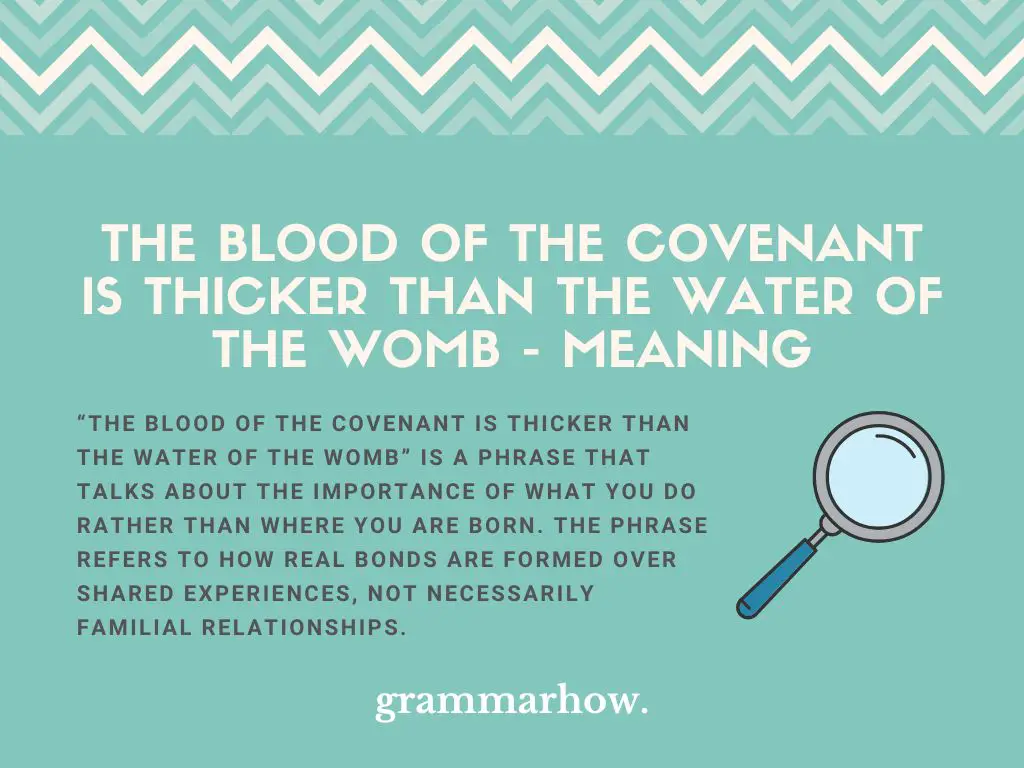You may have heard the phrase “the blood of the covenant is thicker than the water of the womb” before, and maybe you weren’t sure what it means, exactly. This article will explain the phrase’s meaning, and how it can be used.
The Blood of the Covenant Is Thicker Than the Water of the Womb – Meaning
“The blood of the covenant is thicker than the water of the womb” is a phrase that talks about the importance of what you do rather than where you are born. The phrase refers to how real bonds are formed over shared experiences, not necessarily familial relationships.

How to Use “The Blood of the Covenant Is Thicker Than the Water of the Womb” in a Sentence
“The blood of the covenant is thicker than the water of the womb” is a phrase that might seem too long and unwieldy, but you can actually put it to good use in sentences for your daily life. Here we have assembled some example sentences to demonstrate this fact:
- The blood of the covenant is thicker than the water of the womb, which is why we’re good friends.
- The blood of the covenant is thicker than the water of the womb, so don’t let it get to your head.
- The blood of the covenant is thicker than the water of the womb, no matter what happens here.
- The blood of the covenant is thicker than the water of the womb, at the end of the day.
- The blood of the covenant is thicker than the water of the womb, if you really think about it.
- The blood of the covenant is thicker than the water of the womb, don’t you know.
- The blood of the covenant is thicker than the water of the womb, so we’re basically family.
The Blood of the Covenant Is Thicker Than the Water of the Womb – Origin
“The blood of the covenant is thicker than the water of the womb” is a phrase that comes from a bible verse, and argues that the blood of the bonds formed with people through hardship is thicker, more valuable, than the water of the shared womb of family.
The Blood of the Covenant Is Thicker Than the Water of the Womb – Synonyms
The core idea behind “the blood of the covenant is thicker than the water of the womb” is one of found family over genetic family, and about crafting real relationships with people. There are, of course, other ways to express this sentiment, and here are some of those:
- Found family is often more real than a genetic family.
- You can’t fake bonds like the ones we have crafted together.
- Our experiences bond us in a way that genetics could never.
- The blood we have shared is less valuable to me than our shared experiences.
- Our time together means more to me than our shared genetics could ever.
Correct Ways to Say “The Blood of the Covenant Is Thicker Than the Water of the Womb”
Because it’s the sort of idiom that gets repeated quite a lot over the years, there are a lot of variations, and correct ways to say “the blood of the covenant is thicker than the water of the womb”. Here are some of these correct ways, for you to learn:
- The blood of our bonds is thicker than the water of the womb.
- The blood of our covenant is thicker than the water of our shared womb
- The covenant’s blood is thicker than the womb’s water.
- The covenant blood is actually thicker than the womb water.
Incorrect Ways to Use “The Blood of the Covenant Is Thicker Than the Water of the Womb”
There is one main incorrect way in which many people use the phrase “the blood of the covenant is thicker than the water of the womb”. This is by shortening the phrase to “Blood is thicker than water”, which completely inverts the phrase’s meaning.
When you say “blood is thicker than water”, you’re saying that family, genetic family, is more important and valuable than people who are not family in the first place.
However, the true phrase, “the blood of the covenant is thicker than the water of the womb”, actually means the complete opposite: That genetic family is not as important as connections formed by hardship.
In What Situations Can You Use “The Blood of the Covenant Is Thicker Than the Water of the Womb”?
“The blood of the covenant is thicker than the water of the womb” is a phrase that should normally be used to talk about how the bonds that you’ve built with people through experiences you’ve gone through together are bigger than the bonds you get by being related to them.
Therefore, it’s a really handy phrase to remember for you to talk about how important some people are to you, because you value them more than you do your own family.
